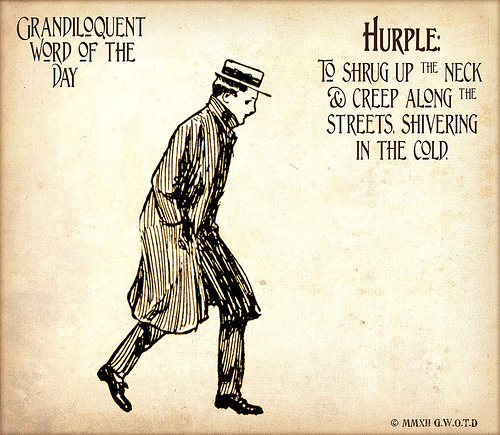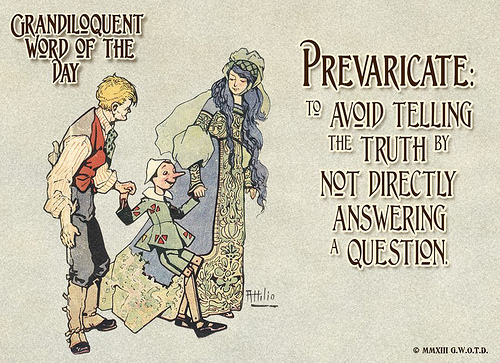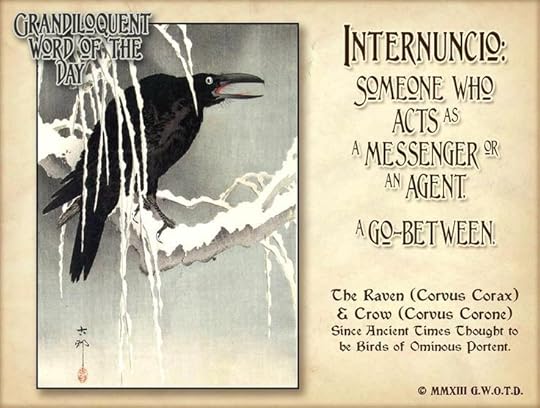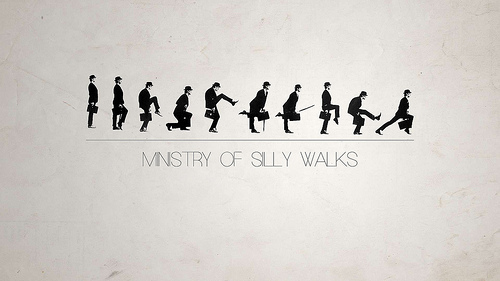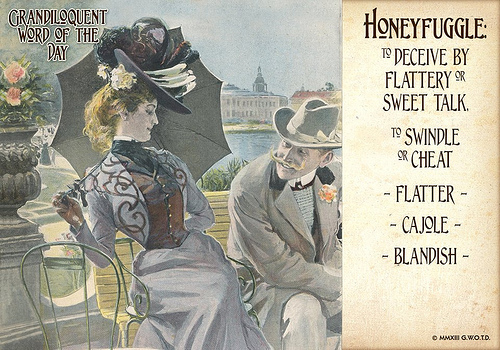Short & Sweet Treats discussion
Take a Coffee Break...
>
Word of the Day
message 151:
by
Ƹ̴Ӂ̴Ʒ Jenn Ƹ̴Ӂ̴Ʒ
(new)
Dec 05, 2013 01:37PM
 Oh I wish this were true about me!
Oh I wish this were true about me!
reply
|
flag
 UMBRAGE
UMBRAGEUHM-brij) noun
1. Offense or annoyance arising from some insult.
2. Shade, as from a tree.
3. A vague suggestion or a feeling of suspicion.
[From Latin umbra (shade, shadow), which also gave us the words umbrella, adumbrate, and somber.]
"A number of judges clearly took umbrage at McDowell's comments; Supreme Court judge Mr. Justice Adrian Hardiman implicitly criticised him from the bench." Pat Leahy; Judiciary Considers McDowell's Watchdog Proposal; The Sunday Business Post (Dublin, Ireland); Jan 7, 2007.
 nimiety
nimietyPRONUNCIATION:
(ni-MY-i-tee)
MEANING:
noun: Excess or redundancy.
ETYMOLOGY:
From Latin nimius (too much). Ultimately from the Indo-European root ne (not), which also gave us nil, null, not, never, nothing, nihilism, annihilate, and naughty. Earliest documented use: 1542.
USAGE:
"As he said it, a nimiety of memories came back to him of the sick, the wounded, the dying: disease, war, famine, flood, fire, devastation."
Chelsea Quinn Yarbro; A Feast in Exile; Tor; 2001.
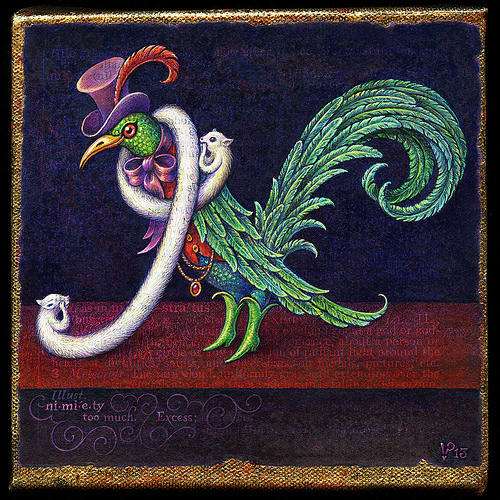
 MONDEGREEN
MONDEGREENMEANING:
noun: A word or phrase resulting from mishearing a word or phrase, especially in song lyrics. For example:
"The girl with colitis goes by" for "The girl with kaleidoscope eyes" in the Beatles song "Lucy in the Sky With Diamonds".
ETYMOLOGY:
Coined by author Sylvia Wright when she misinterpreted the line "laid him on the green" as "Lady Mondegreen" in the Scottish ballad "The Bonny Earl of Murray". Earliest documented use: 1954.
USAGE:
"Since I live in Thailand, the most meaningful mondegreen for me was my own mishearing of a line from The Jam's Eton Rifles. Instead of the correct 'What chance do you have against a tie and a crest?', for years I heard 'What chance do you have against a Thai in a dress?'"
Richard Watson Todd; Much Ado about English; Nicholas Brealey Publishing; May 1, 2007.
(And after Jen's "hurple", I want to thank her for the "Grandiloquent Word of the Day." Here's "mondegreen" lol:
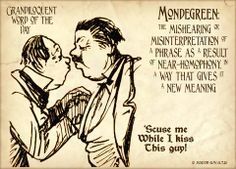
 Jen ƸӜƷ wrote: "nimiety
Jen ƸӜƷ wrote: "nimietyPRONUNCIATION:
(ni-MY-i-tee)
MEANING:
noun: Excess or redundancy.
ETYMOLOGY:
From Latin nimius (too much). Ultimately from the Indo-European root ne (not), which also gave us nil, null,..."
Jen, where in god's name are you finding these BEAUTIFUL graphics??? I saved the 'sloth' one to my hard drive the second I saw it. I didn't think it could get much better, but today's is even better! Thank you so much for sharing them with us!!!
LaLaLa Laura wrote: "haha I hear one too in that second line. I don't think I can say here the mondogreen I hear!"
LOL!!!! I think EVERYONE hears the same *ahem* 'feminine product' that I'm 99% sure you are referring to here! LOL
 Same here! Always got that line confused...
Same here! Always got that line confused...Site I use for words:
http://wordsmith.org/words/today.html
 Jen, I'm LOVING this "Grandiloquent Word of the Day"! Here's another (that reflects my type of housecleaning);
Jen, I'm LOVING this "Grandiloquent Word of the Day"! Here's another (that reflects my type of housecleaning);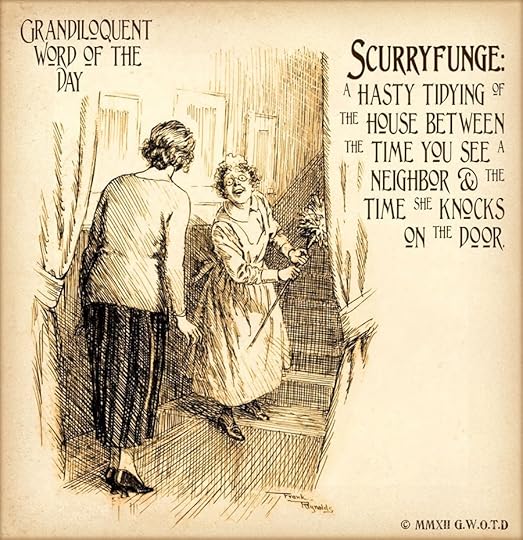
 inoculate
inoculatePRONUNCIATION:
(i-NOK-yuh-layt)
MEANING:
verb tr.:
1. To treat with a vaccine to induce immunity against a disease.
2. To introduce an idea into someone's mind.
3. To safeguard or protect.
ETYMOLOGY:
From Latin in- (in) + oculus (eye; bud, referring to grafting of a bud into a plant of a different type). Earliest documented use: 1420.
USAGE:
"Michael G. Gartner observed last week: 'You see these young people come and you see them every day and you try to inoculate them with your values and you take great pride when they move up.'"
Felicity Barringer; News Executive Leaving It Behind For a Baseball Life; The New York Times; Sep 6, 1999.
"It's a way to help inoculate her campaign from the program's troubles."
John Frank; Will Hagan's New Tough Talk on Healthcare Work?; News & Observer; Nov 12, 2013.
 AMANUENSIS
AMANUENSISplural aman·u·en·ses
one employed to write from dictation or to copy manuscript
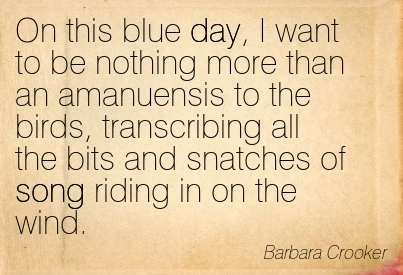
Origin of AMANUENSIS
Latin, from (servus) a manu slave with secretarial duties
First Known Use: 1619
 GNATHIC
GNATHICPRONUNCIATION:(NATH-ik)
MEANING:
adjective: Of or relating to the jaw.
ETYMOLOGY:
From Greek gnathos (jaw). Ultimately from the Indo-European root genu- (jawbone, chin), which is also the source of chin, prognathous , and Sanskrit hanu (jaw). Hanuman (literally, having a large jaw) is the name of a monkey god in the Hindu pantheon. Earliest documented use: 1882.
USAGE:
"For the first time in his life Judah sees the strangeness of the khepri, hears the scissor-sounds their gnathic movements make."
China Miéville Iron Council
 I would imagine this is where 'gnashing of the teeth' comes from?
I would imagine this is where 'gnashing of the teeth' comes from?I know I'm going to be gnashing my teeth through the next 3 shifts until....VACATION TIME!!! WOO-HOO!!!!
~Teresa~
 LOVE THAT! Doctor Who just makes it better! I'm *almost* glad its not summer anymore so I don't have to deal with the humidity making my hair go POOF!!!! :-P
LOVE THAT! Doctor Who just makes it better! I'm *almost* glad its not summer anymore so I don't have to deal with the humidity making my hair go POOF!!!! :-P~Teresa~
 skint
skintPRONUNCIATION:
(skint)
MEANING:
adjective: Having no money; broke; poor.
ETYMOLOGY:
A variant spelling of the word skinned, as in, so broke that even one's skin is shaved off. Earliest documented use: 1925.
NOTES:
Most of the time we make past participle of a word by adding -ed to it (walk/walked), but sometimes we use the phonetic spelling as in today's word. Some other examples are burnt, learnt, spilt, and spoilt. By the way, the word 'past' itself is a phonetic spelling of 'passed'. The -t spellings are more common in British English.
USAGE:
"I've had a run of bad luck recently and I'm totally skint."
Mark McGivern; Bookie Refuses to Pay Out; Daily Record (Glasgow, Scotland); Nov 13, 2013.
 :-) It's all thanks to you and your find of the "Grandiloquent" words!
:-) It's all thanks to you and your find of the "Grandiloquent" words!And I think many politicians are quockerwodgers who have been honeyfuggled by lobbyists lol.
 pratfall
pratfallPRONUNCIATION:
(PRAT-fawl)
MEANING:
noun: A humiliating failure, blunder, or defeat.
ETYMOLOGY:
A pratfall is literally a fall on the buttocks. The word is figuratively used to describe embarrassing errors or failures. From prat (buttocks, fool) + fall. Earliest documented use: 1939.
USAGE:
"Some caution that stockpiling is ending and both markets are in for a pratfall."
Ray Turchansky; Asian Consumers Likely Spend Us Out of Our Financial Mess; The Vancouver Sun (Canada); Aug 21, 2009.
 SNIRTLE
SNIRTLEsnêr-dl
Meaning: A soft, suppressed laugh, a soft snortle (itself a reduced snort) or shortened snigger.
"The girls just snirtled, then went back to the kitchen for a good laugh when the guys noticed that their pizza had chocolate chips in it."
Kintsukuroi "is a Japanese noun meaning 'to repair with gold'; the art of repairing pottery with gold or silver lacquer and understanding that the piece is more beautiful for having been broken."
 What a beautiful word, Laura. I found this picture, and it's very true that the patterns are uniquely lovely.
What a beautiful word, Laura. I found this picture, and it's very true that the patterns are uniquely lovely.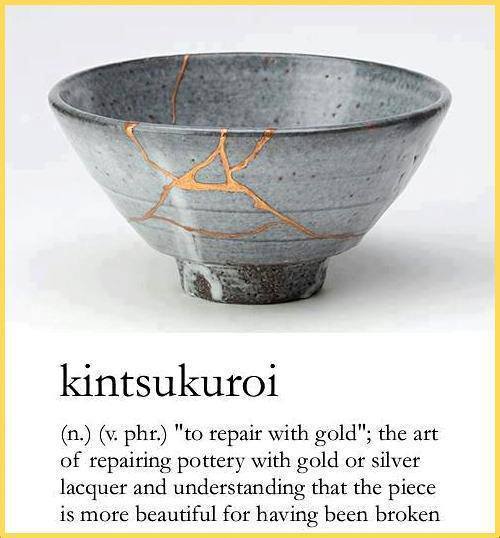
 I'm liking this idea of finding beautiful words; mine for today is:
I'm liking this idea of finding beautiful words; mine for today is:DIAPHANOUS
1. characterized by such fineness of texture as to permit seeing through
2. characterized by extreme delicacy of form : ethereal
Example: "The bride wore a diaphanous veil."
Origin of DIAPHANOUS
Medieval Latin diaphanus, from Greek diaphanēs, from diaphainein "to show through"
First Known Use: 1614
I instantly thought of Botticelli's painting "Primavera" (Allegory of Spring), with the three Graces:
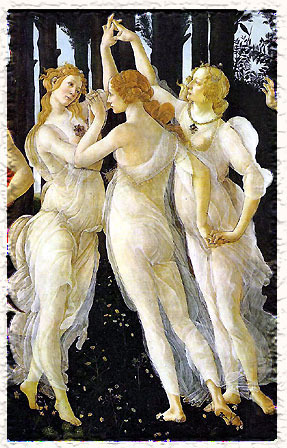
Julia wrote: "Jen, I'm LOVING this "Grandiloquent Word of the Day"! Here's another (that reflects my type of housecleaning);
"
haha! that's me!
"
haha! that's me!
Julia wrote: "What a beautiful word, Laura. I found this picture, and it's very true that the patterns are uniquely lovely.
"
that is a beautiful picture. I also saw it referred to as "golden scars. "
"
that is a beautiful picture. I also saw it referred to as "golden scars. "
 LaLaLa Laura wrote: "Julia wrote: "What a beautiful word, Laura. I found this picture, and it's very true that the patterns are uniquely lovely.
LaLaLa Laura wrote: "Julia wrote: "What a beautiful word, Laura. I found this picture, and it's very true that the patterns are uniquely lovely."
that is a beautiful picture. I also saw it referred to as "golden sca..."
And here's a picture that fits the idea of "golden scars" in HUMAN life as well! I wish I could read Italian to discover the artist's name: http://riotrest.wordpress.com/2013/10...

 Samantha wrote: "Oh my gosh I love this one!
Samantha wrote: "Oh my gosh I love this one!"
Haha, i like this one. I haven't read enough books yet to feel this way, but my sisters have actually had this fear.
Books mentioned in this topic
The Clicking of Cuthbert (other topics)The Crucible (other topics)
A History of Modern Drama, Volume I (other topics)
Toy Stories: Photos of Children from Around the World and Their Favorite Things (other topics)
The Book of Life (other topics)
More...
Authors mentioned in this topic
Leo Tolstoy (other topics)P.G. Wodehouse (other topics)
Leonardo da Vinci (other topics)
Theodore Roethke (other topics)
David Krasner (other topics)
More...



